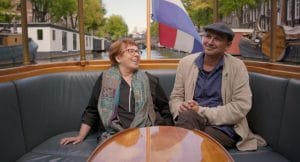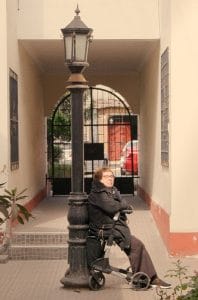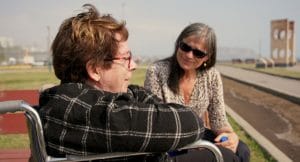Heddy Honigmann, human filmmaker par excellence, leading Dutch documentary filmmaker with a magnificent body of work. One of the three Masters at the Netherlands Film Festival and present there with two titles. Her earlier this year released 100UP On energetic over-100s, and its latest, No Hay Camino. Special because she is now the protagonist herself. Following in the cinema.
"That was a bit of a shock," confesses Heddy Honigmann in No Hay Camino. "That Pieter said I should also direct it myself." Pieter is Pieter van Huystee, the producer of this autobiographical documentary in which Honigmann looks back at her work and her childhood in her native Lima, among other things.
The title No Hay Camino is taken from a line of poetry by Antonio Machado. 'Traveller, there is no path. You make it yourself as you walk.' The film is also a reunion with Pieter van Huystee, long its regular producer. Hence this interview with him. What was his 25-year walk with Honigmann like? With the acclaimed filmmaker who is always driven by her curiosity for people. Still. Despite the fact that, as Honigmann puts it in a commentary, "an illness is doing its best to control my life". In the film, we see her in a wheelchair, pushed along monotonously by her lover Henk Timmermans. Multiple sclerosis has bothered her for a long time. Now cancer has been added to that. But the 'maker's urge', as she calls it, is still there.
Dare to dream
So when I walk into the office of Pieter van Huystee Film & TV, my first question is: How is Heddy doing?
"It's just how you look at it," Van Huystee replies. "She is cheerful, upbeat and we have a lot of fun together." And with some caution: "It's not her last film either, although that's not up to me." In fact, there is already a new title: Under the stars.
"We always have a game together, ever since the 25 years we have been working together. We like to chat, we get along well. Then we often sit and think of films, just as conversation. Peter Delpeut once said, you have to dare to dream a film, you have to dare to dream a character, and Heddy can really do that."
To illustrate how that works, Van Huystee cites O amor natural to, the first film he produced with her. He had then just started working as an independent producer. Before that, he had worked as a programme maker at IDTV. As part of the programme Taxi did he happen to have Metal and melancholy seen. That was the critically acclaimed film about taxi drivers in her native Lima, with which Honigmann broke through as a documentary filmmaker in 1994. At the time, Van Huystee was also producer for IDTV of Moved Copper by Johan van der Keuken, already a big name in the documentary world. And Heddy Honigmann was friends with Johan and his wife Noshka van der Lely.
Erotic poems
After making Metal and Melancholy, which is now considered a classic, her work stood curiously still. "Johan introduced me to her. Heddy was talking about a little book by a certain Carlos Drummond d'Andrade, a poet of great prestige in Brazil whom I had never heard of. At eighty, he had written a beautiful collection of erotic poems, and Heddy said, 'We're going to make a film about this.' I had only just met Heddy, but I replied, 'Yes, we will.' Heddy had never convinced a producer so quickly."
Because Heddy not only wanted to make a film about those poems, she had also dreamed up characters.
"She suggested: 'We are going to ask older people to read a poem like this and then think back to their own erotic lives.' I naturally asked, 'What kind of people are we going to ask? It has to be people who can also relate.' That's how we came up with hairdressers, or waiters, among others."
"With a contact who could introduce us, we travelled around Brazil for a fortnight. There we also met, for example, that Olympic swimmer who was already older, a very beautiful dignified woman who could express herself very well. In that way, you then find the characters together who are representative of the bigger story you want to make. That's the way Heddy works."
"That's how it went for The underground orchestra. The big theme was the diaspora of people who came to Paris and had to leave their home countries for whatever reason. Heddy then chose the musicians among them. In the metro, we had discovered, those musicians in turn represent an underground orchestra. For days we walked through the metro, looking for musicians who could tell that story."
Just last year O amor natural chosen as best documentary in 25 years The hour of the wolf. But Van Huystee notes that his way of working, with a strong focus on the maker's signature and rhythm, fits less and less with the efficiency society. "We are among the last of the mohicans. Sometimes even when I first talk to a maker, while they are telling their story, I see another story on their forehead."
Good people
"What typifies Heddy is that, first of all, she has a very clear film idea. O amor natural or The underground orchestra, but also Buddy, about guide dogs and their owners, are good examples of this. Secondly, she just picks good characters. She knows damn well when it works or doesn't work. Then she enters into a conversation with them - she won't mention the word 'interview'. In that conversation, she has a particularly good ear for that one telling byline. Then she turns down that path, occasionally a dead end, but it may also be that she's onto something. She has a particularly good nose for that. That is also a lesson I learned from her as a producer. The beauty in people is often a bit hidden, you have to find that."
At No Hay Camino she notes somewhere that there are many good people, they just don't stand out.
"She also wants those to come forward. She is not cynical, she is not sarcastic. She does understand that sometimes it takes some searching, but she will always steer in that direction in the editing or selection of material. So yes, I think that's what typifies her."
"Along with that, there is one other thing: she just has humour, she sometimes has something light, something mischievous. Her films are therefore also warm. With The underground orchestra I was asked: 'Are we going to do that in Paris or Berlin? I say: 'Paris'. Berlin I was adamantly against. Heddy fits the Mediterranean life, although that doesn't really make sense because she is from South America."
Self-portrait
We now come to No Hay Camino (There is no way). Was there another story on her forehead as well?
"Well, maybe... Look, NTR really wanted a film about Heddy Honigmann. They already had a director in mind for that too. A very good guy, let me put that first. But yes, Heddy is sometimes like a cat, if you get too close you can get a slap. That didn't work, I could tell. So then I said to Heddy: 'You just have to make that film yourself'."

"Yes, she was indeed startled for a moment," he laughs. "So I say, 'I think Rembrandt did very beautiful self-portraits, just like Vincent van Gogh or Ed van der Elsken and Agnes Varda. You have to think of it as a gift to yourself.' And then she also asks this Spanish filmmaker, José Luis Guerin. She just calls him up and says, 'If you make a five-minute film for me I'll fit that in integrally.'"
"Then I immediately get happy, because I've never experienced that before. That one filmmaker asks another filmmaker. So then I think: that will be an exciting walk with her."
In one of the first scenes, Honigmann and Guerin, seated in a boat sailing through Amsterdam, philosophise about the title. They see that you make your path by walking yourself not only as a life motto, but also as a principle in filmmaking. Heddy notes that she never knew so little about a film beforehand as when she started this one.
"Yes, that's true. You obviously know a lot about your own life, but you're not quite sure yet how honest you can be with yourself. What part of your life do you want to show. Those were the questions she hid behind 'I knew so little'."
"Indeed, the film took shape as we went along. The funds thought it was a thin screenplay, but I said, 'No, it's actually the best screenplay of all time.' You also have to make that path while walking, that is inherent in the phenomenon of documentary and certainly creative documentary."
On the move
So what were the elements you went out with?

"There were essentially three elements. Firstly, she wanted to go back to Peru to recover some things. Also to face the history with her father."
He is referring to the difficult relationship Heddy Honigmann had with her overprotective father, Victor Honigmann (died in 1994). This artist, known in Peru as creator of the comic book hero Supercholo, had survived the Holocaust by escaping from camp Mauthausen in 1942. Due to the trauma he suffered, he was not always the easiest.
"The second element was the plan to make the trip to Mauthausen with her regular taxi driver. But because of the Covid, we couldn't film that, we couldn't travel."

"The third component was the medical process. Not to portray that directly, but to see the impact it has. To be honest and critical of yourself, you also need a certain energy. That is why we asked Kristien Hemmerechts, a good friend of hers for years, to also ask the probing questions. The questions that you don't really want to be asked but that you allow anyway. Hemmerechts, of course, as a writer, has the ability to see through a character. So those were the starting points, in terms of content."
"Apart from that, of course, you have the film style. They are conversations, not interviews. It is an inspirational film, so it is not meant to highlight your own bad luck in life. It is named, but it should be inspiring to others. Not to give yourself another stroke."
"We were very aware of that. So that's why there's a scene where they're in the café, where a woman is singing, and they're just having a good time. Heddy even gets a bit tipsy, it seems, you can see it in those eyes. That's also exactly how she wants to celebrate life."
She says she is still full of ideas. It also reminds me of 100UP, her film about energetic over-100s.
"If you have that, you radiate something that other people can also relate to, so that was an important thing. It's always about survival, about life force. That sometimes we are unlucky we know, but how do I go on."
Father
"If you ask now, what did we not know beforehand, it was that her father's role was going to be so big. In the end, that comes back in all sorts of places."
For instance, there is a special scene in which Heddy sees a childhood friend from before. She discovers that the latter has very different and much more positive memories of her father than herself.
"Eventually we saw that line emerge. Then also comes that conversation with Johanna ter Steege, in which Heddy says that after reading Is this a human being of Primo Levi could finally forgive her father. But then her son, who happens to be behind the camera that day, says: "Yes, you have been so overprotective too. As a child, he dared not go her way after a fireworks accident." When Heddy hears that then, she is silent for a moment.
"Then you also see that deeper theme. Then you talk about the second- or third-generation syndrome. You see that in immigrant families it takes as many as three or four generations to feel accepted. Then you see that it's not just about a filmmaker, but that it's a truly universal story."
"But could we have written that beforehand in a film plan? No. That's exactly what I mean. She didn't yet know how far she dared to go, and then she finds that, step by step actually, she discovers what she wants to invent."
As Heddy Honigmann and Pieter van Huystee did at the time of O amor natural neither could foresee how their further journey as filmmakers and producers would unfold.
"That's always a delicate thing after a first film," Van Huystee laughs. "Are we going to make a second film? But after seven films, we had said most of it to each other. We weren't so much bored with each other, but you do start repeating yourself. We parted ways at Forever. She chose a working method there that I actually disagreed with. I noticed the beginnings of a grumpiness. Heddy also made very beautiful films with others after that. But because we had parted well, we were now able to resume working together as well."
Under the stars
At No hay camino she says she is still full of ideas. Van Huystee stresses that this autobiographical work is definitely not a farewell. A new film is in the making!
"I now also take the opportunity to interact a lot with her, because we have helped each other, it has been important, we have been able to make beautiful films." Noting that the work he was allowed to produce by Honigmann and also Johan van der Keuken opened doors for him as a producer.
"So, when I take her to the edit by car again, she says, 'I'm sitting with the thought for a new film. It seems so terrible to be homeless, I can't imagine not having a roof over your head. So the title will be, I think, Under the Stars.' "
"That immediately captures the imagination. I can then already see an opening image with a starry sky and maybe trees, because a lot of people seem to sleep in the Vondelpark. But yes, in the city there is a lot of light pollution, you don't see many stars there."
"So I say, 'You know what, the Netherlands doesn't have many mountains, but at least in Limburg there is a kind of mountain, and suppose we find a refugee who, because he came from a mountainous area, wants to be in a mountain environment. He can then tell his story in his own way. How he had to sleep under the stars on his way here."
"And so it begins..."
No Hay Camino had its world premiere at the Canadian Hot Docs festival earlier this year. Dutch premiere on 28 September at the Netherlands Film Festival. In cinemas on 30 September. Also 100UP can be seen at the NFF.
The Master call with Heddy Honigmann at the Netherlands Film Festival will take place on 29 September, at 13:45 at Kinepolis.
